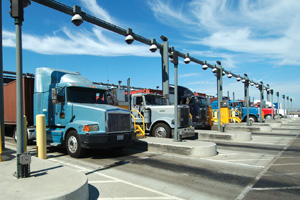Senior Reporter
Appeals Court Rejects L.A. Port’s Ban on Independent Truckers

A federal appeals court Monday rejected a plan by the Port of Los Angeles to ban independent operators from drayage operations, giving American Trucking Associations a victory in a major point of its lawsuit challenging several points in the port’s clean trucks program.
The port’s plan required drayage drivers to be employees of licensed companies, rather than independent contractors.
The U.S. Ninth Circuit Court of Appeals, however, agreed with a lower court’s ruling that the port may impose requirements regarding drayage operator maintenance, financial capability, off-street parking and placarding.
The plan by the Port of L.A. — part of the largest port complex in the United States along with the neighboring Port of Long Beach — has been in litigation since 2008, when ATA challenged its provision that only trucking company employees, and not independent operators, be allowed to operate at the port.
“We bill this as a major win,” said ATA Vice President and Chief Counsel Robert Digges Jr. “We’re a little disappointed in some of the other minor aspects of it.”
Port officials said they have not yet made a decision on whether to appeal the case to the U.S. Supreme Court, a spokesman said following the ruling.
“We are pleased that almost all aspects of our concession program have again been upheld by the U.S. Court of Appeals for the 9th Circuit,” said Geraldine Knatz, the port’s executive director.
“The measures upheld in this ruling allow for significant accountability from the trucking companies that call at the Port of Los Angeles,” she said in a statement.
But the court handily rejected the port’s argument that the port is a business and not a governmental entity, ruling that the port is not preempted from a federal law that leaves the regulation of interstate commence to the federal government.
“While the port may impose conditions on licensed motor carriers seeking to operate on port property, it cannot extend those conditions to the contractual relationships between motor carriers and third parties,” the court stated.
Although ATA did not oppose reducing diesel emissions in the port, Digges said ATA’s primary objection to the clean trucks plan was the requirement that all drayage operators be employees of licensed motor carriers.
“I think to the extent that we got into this case to eliminate the independent contractor ban, we accomplished what we wanted, and we won,” he added.
Digges said that some of the port’s requirements affirmed by the appeals court are a “headache for motor carriers and some are a financial burden. . . . But it doesn’t change their whole business model the way the independent contractor ban did.”




